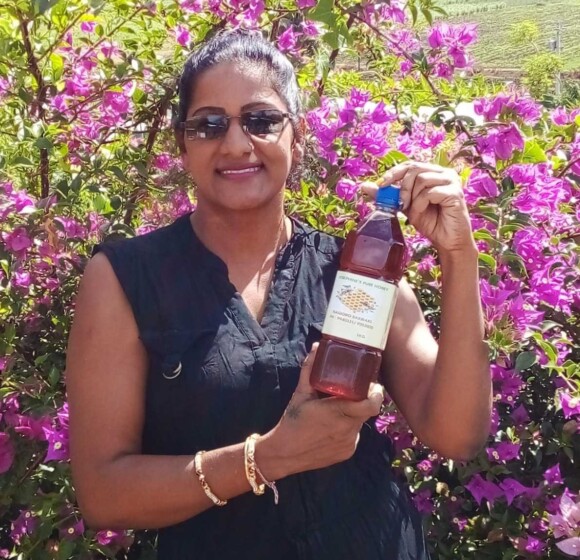Alparti’s bee venture
November 25, 2020

By Neehal Khatri
Alparti Josephine has amassed a wealth of knowledge in beekeeping over the past 13 years. She began in 2007 with a small farm of 4 beehives based in Rakiraki and a drive to learn as much as she could about beekeeping.
“I started because I was excited – I had heard about bee farming and I just wanted to try something differen I had plenty of interest in bee farming and I started with 2 ladies in a group but it didn’t work in a group so we decided to split and have our own and from there I just grew,” Alparti said.
According to a value chain analysis of honey production in Fiji, beekeeping is predominantly a male-oriented activity, with women beekeepers estimated at 5%. However, women’s participation in the beekeeping industry is being encouraged with training and technical assistance provided by the Ministry of Agriculture, the Fiji Beekeepers Association and other cooperatives/groups.
Alparti shared that her mentor was John Caldeira from the Fiji Beekeepers Association, who visited her farm to teach her the ropes of beekeeping after learning about her interest. She further developed her skills by participating in a training program conducted by agricultural officers, but mainly she learnt through hands-on experience.
“Most of the things I learnt from my experience by working with bees every day and reading articles online. It’s by observing bees and working with them daily that you’ll know how to handle them.”
Today, Alparti has 60 beehives from which she is able to produce about one tonne of honey per year and her customers include individual and bulk buyers. In 2018, her hard work was rewarded when she won the first prize for best honey at the Fiji Beekeepers Association symposium held in Nausori.
While her farm size has increased gradually over the years, Alparti continues to run the business with the help of family members – her husband and her teenage son.
“In bee farming, you don’t have to work in the hives every day. It’s like once in a week or once in a fortnight so I have plenty time for my family and my children and for their studies.”
She added that while there were many opportunities to expand her business by producing honey by-products and selling bee boxes, she was happy to continue operating at a small scale so she could spend more time with her family and on other things.
Challenges
With the current COVID-19 pandemic, Alparti says she has noticed a decline in demand from bulk buyers, who often paid in advance for the honey. She speculates this could be because some of the buyers were supplying to resorts, which have been badly affected by the decline in tourism. Another reason could be that more people have taken up beekeeping, leading to increased competition. Despite this, Alparti says she is able to sell all the honey that she produces on her farm.
Another challenge Alparti has experienced in the past is cyclones. In 2016 when Category 5 Severe Tropical Cyclone Winston hit Fiji, Alparti faced massive damages to her beehives. Out of the 28 beehives she had, she was able to revive only a few and she slowly rebuilt her farm by splitting these. However, Alparti has learnt from this experience so when Tropical Cyclone Harold hit earlier this year, she made sure that all her beehives were properly tied down and secured.
While beekeeping has its challenges, after spending 13 years in the business Alparti is still enthusiastic about the work she does.
“One thing I have learnt from bee farming is that bees are such beautiful creatures. They are so little, but they work so hard. They are the busiest insect in the world and if they can work so hard to collect such lovely honey, we should be like them too – we should work hard and it’s always fruitful to work so hard.”
In the Spotlight: Informal Women Workers
As part of the 16 Days of Activism global campaign, we are sharing a series of stories featuring the experiences of women entrepreneurs in the informal sector as well as those who have transitioned, or are transitioning, into the formal sector.
16 Days of Activism is a global campaign focused on ending violence against women and promoting women’s rights. In 2020, the Campaign is dedicated to informal women workers whose lives and livelihoods have been acutely impacted by COVID-19 and the unprecedented economic crisis that has followed. According to the International Labour Organization, more than 60% of the world’s employed earn their living in the informal economy and 92% of women in employment in developing countries are informally employed. They face precarious workplace conditions and are typically excluded from national labour laws and denied social protection.
The Australian Government through the Fiji Women’s Fund has been supporting women’s groups, networks and organisations to amplify the voices of women in the informal sector through our partnerships with grantees like the Women Entrepreneurs Business Council, Women in Fisheries Network, Talanoa Treks, Rise Beyond the Reef, Ra Naari Parishad, Naitasiri Women in Dairy, Waisomo Women’s Group and the Soqosoqo Vakamarama Kadavu.
Recent Whats New
Resilience and Sustainability in Action
October 28 2025
Nalini Singh Calls for Collective Feminist Resilience
October 28 2025
